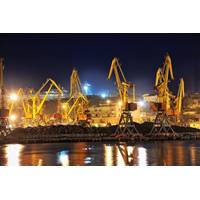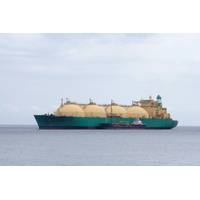Indonesia's President urges developed countries to invest in green economies
Joko Widodo, the Indonesian President on Thursday, urged developed countries to invest in energy solutions and climate change in Indonesia. He highlighted its enormous potential for renewable energy projects and carbon reduction. Jokowi (as the incoming president is known) said that the Southeast Asian country has over 3,600 Gigawatts of renewable power potential. He also stated that the nation's 3.3 million hectares (8.2 millions acres) of mangroves could absorb 12 times as much carbon dioxide as tropical rain forests. He said that climate change issues can't be resolved while investors focus on economic calculations.
Indonesian Coal Export Ban Rattles a Sector

The world's leading exporter of thermal coal on Saturday banned the shipments because of concerns it could not meet its own power demand, prompting President Joko Widodo on Monday to threaten to revoke business permits for any miners who failed to meet domestic market requirements.In turn, Indonesian coal miners want a quick resolution as fuel prices rise and and potential disruptions to the energy supplies of some of the world's biggest economies loom.The wider risk is of a knock-on impact on economic linchpins China…
Indonesia Plans New Gas Pricing for Industrial Users

Indonesia plans to unveil a new gas pricing policy for industrial customers in March in a bid to lower energy costs for manufacturers, Energy and Mineral Resources Minister Arifin Tasrif said on Thursday.Indonesia's President Joko Widodo earlier this week asked his cabinet to come up with a strategy to lower gas prices for manufacturers to around $6 per million British thermal units (mmbtu).Manufacturers have been complaining about gas prices running at about $8-$9 per mmbtu, despite a 2016 rule that ordered energy…
Pertamina, Aramco Extend Cilacap Refinery Talks

Indonesia's PT Pertamina and Saudi Aramco have extended negotiations regarding an upgrade to Pertamina's Cilacap oil refinery December, State-Owned Enterprise Minister Erick Thohir said on Tuesday.The two sides have extended their negotiations a few times since last December as they struggle to agree on a valuation for the project.
Bangladesh Inks Deal with Indonesia for LNG Imports

Bangladesh signed an agreement with Indonesia on Sunday to open talks on imports of liquefied natural gas (LNG), as the South Asian country turns to the supercooled fuel to fill a shortfall of domestic natural gas. A letter of intent was signed between two state energy companies, Petrobangla and Pertamina, after a meeting between Prime Minister Sheikh Hasina and Indonesian President Joko Widodo, who arrived in Dhaka on Saturday. Bangladesh, a country of more than 160 million people, may import as much as 17.5 million tonnes of LNG a year by 2025, as its domestic gas reserves dwindle and demand grows.
Indonesia to Keep OPEC Membership Frozen
Indonesia will keep a freeze on its membership of the Organization of the Petroleum Exporting Countries (OPEC), deputy energy minister Arcandra Tahar said on Tuesday, following "directions" from the country's President. Indonesia's OPEC membership was suspended in December 2016, less than a year after it rejoined the cartel, when the net oil importer could not agree to production cuts. "There are several reasons, but what is clear the decision was we will keep the (membership) freeze," Tahar told reporters, declining to comment further. President Joko Widodo had decided on the matter "several months ago" and OPEC had been informed, he added.
Indonesia Offers 15 Oil Blocks amid Thin Industry Interest
Indonesia is offering 15 conventional and unconventional oil and gas blocks to potential bidders, government officials said on Friday, hoping more flexible terms will help reverse flagging interest in the sector after lacklustre performance in 2016. This year the government is applying new production sharing rules and will revise rules on recoverable costs and cut import duties on exploration equipment where possible, said deputy energy minister Arcandra Tahar, among efforts to incentivise new investment. "If you can show us in your analysis and data that the split is not good enough…
Indonesia's Energy Minister REplaced Over Citizenship Controversy
Indonesia's president on Monday removed Arcandra Tahar as energy and mining minister, the state secretary said, following reports that he held both Indonesia and U.S. citizenship. Pandjaitan will also maintain his current position as coordinating maritime minister. Tahar, a former executive at Texas-based offshore engineering firm Petroneering, was part of President Joko Widodo's second cabinet reshuffle last month. He served less than three weeks as minister.
Work On Indonesian Thermal power plant to Start
The construction of a $4 billion, 2,000-megawatt coal-fired power station in Indonesia will begin on April 1 after years of delay as land acquisitions are finally complete, Japan's Nikkei business daily said on Sunday. PT Bhimasena Power Indonesia, a joint venture set up by Indonesian coal miner PT Adaro Energy Tbk and Japan's Itochu Corporation and Electric Power Development Co. Ltd. (J-Power), will build and operate the Batang plant in Central Java. Neither Itochu nor J-Power could be immediately reached for comment.
Indonesia Turns to Floating Power Stations
Indonesia's president launched the first of five new floating power stations on Tuesday, to serve as a stop gap for the country's growing demand for power amid sluggish development of land-based plants. Southeast Asia's largest economy has set an ambitious goal of building more than 35 gigawatts of power stations by 2019, the bulk of which are expected to be coal-powered. However, the $50 billion mega project has made slow progress since it was launched by President Joko Widodo in April, due to difficulties in acquiring land among other reasons.
Indonesia Hopes to Rejoin OPEC by Year-End
Indonesia hopes to rejoin OPEC by oil producer group's next meeting in around six months' time, Energy Minister Sudirman Said said on Thursday. Last month, the minister said the country's President Joko Widodo had agreed to a plan for Indonesia to rejoin the Organization of the Petroleum Exporting Countries, over six years after Southeast Asia's biggest crude producer left the group. "We didn't withdraw our membership, we just suspended it," Said told reporters in Vienna ahead of OPEC's meeting on Friday in which the group is expected to agree on maintaining its current production ceiling for the next six months.
Indonesia Seeks to Rejoin OPEC
Indonesia left OPEC in 2008 on becoming net oil importer. Energy minister to attend June OPEC meeting as an observer. Indonesia's energy minister said on Thursday he would seek President Joko Widodo's approval for the country to rejoin OPEC, seven years after leaving the oil exporters' group. If it returned, Indonesia would be the fourth-smallest producer in the Organization of the Petroleum Exporting Countries ahead of Libya, Ecuador and Qatar, and bring the number of participants to 13 countries. Indonesia was the only Asian OPEC member for nearly 50 years before leaving the group in 2008 as oil prices hit a record high…
Pertamina Sacks Oil Trading CEO
Indonesia's state-owned oil giant Pertamina dismissed the chief executive of its oil trading arm, Petral, as part of an overhaul of the firm, a company official said on Tuesday. "The CEO and management of Petral have been changed," Ahmad Bambang, Pertamina's director of marketing, told reporters. He said a replacement for Bambang Irianto has already been chosen, but did not provide the name of Petral's new CEO. Since taking office last October, President Joko Widodo has imposed major changes to the energy sector, including the dismissal of Pertamina's board and a probe into Petral to weed out what he calls the country's "oil mafia".
Scrapping of Fuel Subsidies a Landmark and Boost for Indonesia
The announcement came without fanfare, in line with Indonesian President Joko Widodo's style, but his decision to let petrol prices float freely is the most significant move to stabilise Southeast Asia's largest economy in years and shows his resolve to promote reform. On Jan. 1, Widodo's government scrapped subsidies for petrol, letting pump prices rise and fall in line with the cost of crude oil. "It took some guts," said economist Wellian Wiranto at OCBC in Singapore. The subsidy reforms could be the start of more market liberalisation, including in domestic fuel sales.
Indonesia: Petral Shake-Up Needed
Petral, the trading arm of Indonesia's state energy company Pertamina, should undergo a management shake-up, forensic audit and be stripped of its right to handle oil imports, the country's new oil and gas governance team recommended on Tuesday. The recommendations fall short of disbanding Hong Kong-based Petral or relocating it to bring more transparency to operations that supply Indonesia with one third of its daily oil needs. The governance team was set up last month to help the new administration of President Joko Widodo rid the industry of graft and restore investor confidence.
Oil Majors Praise Indonesia's New Approach to Investment
Efforts by Indonesia's new administration to attract investment to the country's troubled energy sector are being viewed favourably by energy giants Exxon Mobil and Chevron. Graft, regulatory, legal and contractual uncertainties have undermined energy investment in Southeast Asia's biggest economy. Aging wells and a lack of exploration have led to declining output and the former OPEC member is now a major fuel importer with soaring energy demands. President Joko Widodo has ordered his cabinet to simplify bureaucracy and de-bottleneck problem areas, Widhyawan Prawiraatmadja, a special assistant to the new energy minister, said on Wednesday.
Price Slump Should End Asian Fuel Subsidies
The 25 percent drop in Brent crude so far this year is providing an unparalleled opportunity for Asian governments to scale back or end fuel subsidies. Some, like India and Malaysia, have already cut off or reduced support for gasoline and diesel, but the worst offender in the subsidy stakes, Indonesia, has yet to take the plunge. The arguments against fuel subsidies are sound. They place a huge burden on the finances of government budgets in developing countries, prevent spending on more worthwhile social infrastructure and distort price signals to the public.
India, Indonesia on Different Coal Paths
India, poised to become the world's largest importer of thermal coal, appears to be opening up its domestic mining sector to foreign competition just as Indonesia, its biggest supplier, is making it harder for exporters. On a superficial level it appears that India and Indonesia are choosing different paths for their coal sectors, but the policies being pursued by the countries' new, reform-minded leaders may have more in common than first appearances suggest. India may allow foreign companies to mine coal, as long as they set up units in the country, Reuters reported on Oct. 22, citing a source familiar with the matter.
Indonesia Sets 2015 Energy Subsidies Lower Than This Year
Indonesia's government is set to spend 1.6 percent less on energy subsidies next year, parliament's budgetary committee said on Monday, providing much needed fiscal space for president-elect Joko Widodo to fund his reform programmes. The finance ministry and budgetary committee agreed on energy subsidies of 344.7 trillion rupiah ($28.8 billion) in 2015, down from 350.3 trillion rupiah this year. The government had initially proposed a higher figure for 2015 of 363.5 trillion rupiah ($30.3 billion). The budget for energy subsidies usually shows an upward trend.
Indonesia Sees 11% Drop in Coal Exports
Indonesian coal exports are expected to drop 11 percent this year due to lower production, a government official said on Friday, as miners grapple with new rules the industry fears will put some firms out of business. Indonesia ships about $2 billion worth of coal a month, one of its largest exports by value and making it the biggest exporter of thermal coal in the world. But the industry has been hit by falling prices and slowing demand from top consumer China, along with government efforts to cap output, revise trade regulations and tighten law enforcement in the sector.
